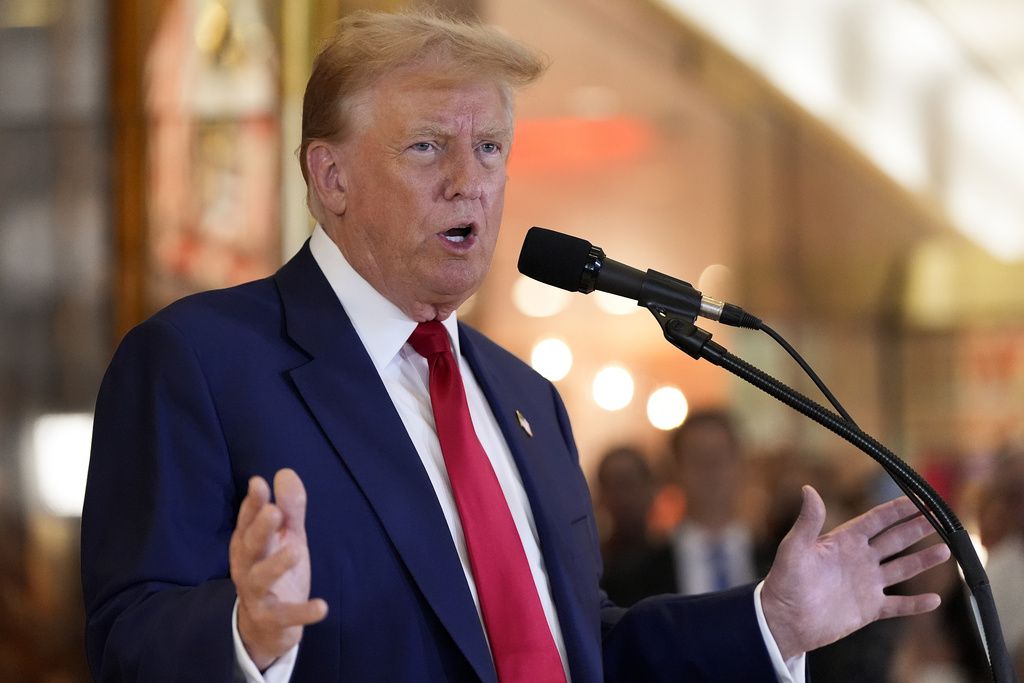

A Manhattan jury convicted former President Donald Trump of 34 felony counts of falsifying business records Thursday, making him a convicted felon.
Trump is expected to appeal the decision but is also still facing three other major criminal cases: The federal election interference case, the classified documents case, and the Georgia election interference case.
Here’s where those cases stand as Trump awaits his July 11 sentencing in the Manhattan hush money case.
Federal election interference case: Supreme Court arguments
Allegations that Trump interfered with the 2020 election coalesced into charges brought by special counsel Jack Smith as he was indicted in August 2023.
A trial date hasn’t been set after an initial March 4 trial was called off. The Supreme Court heard arguments over Trump’s claims of absolute presidential immunity in the case on May 25, and the trial isn’t expected to have a date until they have decided on the case. The high court signaled the trial would not happen until after the election.
During the hearing, Justice Samuel Alito questioned the implications of prosecuting a president for actions taken while in office, saying, “If an incumbent who loses a very close, hotly contested election knows that a real possibility after leaving office is not that the president is going to be able to go off into a peaceful retirement but that the president may be criminally prosecuted by a bitter political opponent, will that not lead us into a cycle that destabilizes the functioning of our country as a democracy?”
Alito has also faced calls from Democrats to recuse himself from this case and others related to Trump and Jan. 6, 2021, after it came out that his wife flew a flag upside down after the riots, a symbol used by Trump supporters. He has rejected those calls.
Trump is facing two felony counts (including one conspiracy count) of obstructing an official proceeding, and one felony count of conspiracy to defraud the United States, one felony count of conspiracy against rights in the case. This case appears to be the closest to moving forward.
Georgia election interference case: Appeal against some charges dropped
Fulton County District Attorney Fani Willis brought a myriad of charges against Trump and 18 other defendants, including his lawyers John Eastman and Rudy Giuliani, for their efforts to overturn Trump’s 2020 election loss in Georgia. Two high-profile incidents included in the case are when Trump called Georgia Secretary of State Brad Raffensperger and urged him to “find” votes that would secure him a win in the state, and when Giuliani called on state legislators to convene a special session to overturn the certification of election results.
Trump was initially charged with 13 state felony counts, which he pleaded not guilty to. Judge Scott McAfee threw out three of the charges against Trump, and three others against others named in the case as well, in March. Willis appealed McAfee’s decision on May 23 in a move that will likely further delay the trial.
“In some ways it’s an implicit concession that it’s not going to happen before November,” Anthony Michael Kreis, a law professor at Georgia State University, told the New York Times.
Classified documents case: Postponed indefinitely
The slowest-moving of Trump’s three remaining cases, which was brought by Smith who alleged Trump held onto sensitive documents after leaving the White House. The former president was charged with 37 felony counts, including conspiracy to obstruct justice and corruptly concealing a document or record, in June 2023 after the FBI searched his Mar-a-Lago home in August 2022.
CLICK HERE TO READ MORE FROM THE WASHINGTON EXAMINER
The case was originally scheduled to go to trial on May 20, but Judge Aileen Cannon, appointed by Trump, postponed it indefinitely due to pretrial conflicts. Some consider the case to be persuasive against Trump, as Smith cites Trump’s own statements and the former president has even said publicly that he “took the documents.”
Prosecutors recently called on Cannon to order Trump to stop making false claims that the FBI was ordered to kill him when they searched his Florida home in August 2022. The search warrant authorized the use of deadly force, but experts say that is typical in these types of documents.






